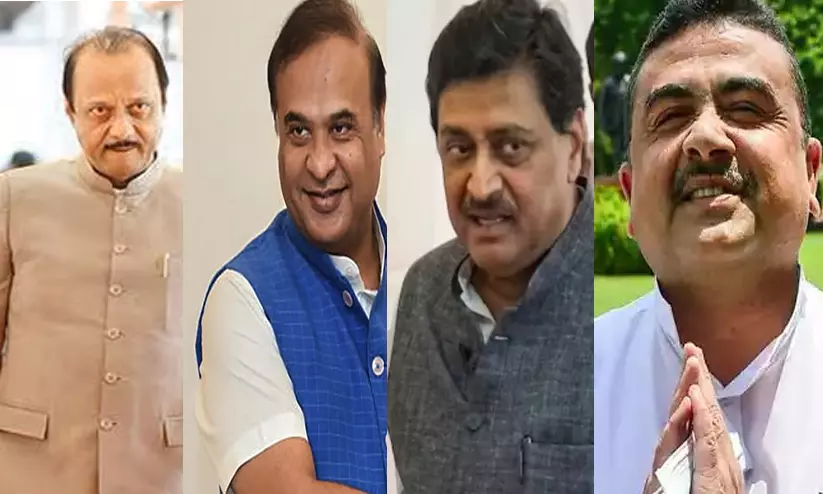
23 of 25 leaders whose corruption charges dropped upon joining BJP since 2014
text_fieldsIn a comprehensive investigation conducted by The Indian Express, a pattern of alleged political patronage has been unearthed, suggesting a concerning trend of cases against prominent politicians facing inaction or closure upon their affiliation with the ruling Bharatiya Janata Party (BJP).
The probe highlights a significant disparity in the treatment of cases based on political allegiance, raising questions about the impartiality of investigative agencies.
Since 2014, a staggering 25 prominent politicians facing actions from Central agencies for alleged corruption have crossed over to the BJP, cutting across party lines. The investigation reveals that in 23 of these cases, the political move to the BJP has coincided with reprieve, with either closure or significant delays in proceedings. The timing of these transitions, often just before general elections, raises suspicions about political motivations behind these switches.
The investigation points out a stark contrast in the treatment of cases based on the political affiliation of the accused. While politicians in opposition parties face aggressive actions by investigative agencies, those aligning with the ruling BJP seem to enjoy leniency or stagnation in their cases. This apparent discrepancy underscores concerns about the independence and integrity of law enforcement agencies.
A notable example cited in the investigation is the case of Ajit Pawar, a prominent leader from Maharashtra. The Economic Offences Wing (EOW) filed a closure report against him in October 2020, only to seek reopening once he joined the BJP-led NDA coalition. However, upon his affiliation with the NDA, the case was again closed in March, rendering the Enforcement Directorate's (ED) subsequent actions infructuous. Similar instances involving other politicians from various states further substantiate the alleged pattern of political favouritism.
Moreover, cases that remain open often languish in cold storage, with minimal progress or notable inaction from investigative agencies. Instances such as the stalled prosecution of West Bengal Leader of Opposition Suvendu Adhikari in the Narada sting operation case, despite being an MP at the time of the alleged offence, exemplify the sluggishness in pursuing cases against BJP-affiliated individuals.
Furthermore, the investigation sheds light on instances where politicians facing serious allegations join the BJP and subsequently witness a halt in legal proceedings against them. Himanta Biswa Sarma, now the Chief Minister of Assam, faced CBI questioning and raids in 2014 in the Saradha chit fund scam. However, since joining the BJP in 2015, the case against him has shown no significant progress, raising concerns about the impartiality of the investigative process.
The investigation also delves into cases where investigations seemingly take a different trajectory once the accused switches parties. For instance, the case against Assam Chief Minister Sarma, as well as that of former Maharashtra Chief Minister Ashok Chavan, have both encountered impediments despite serious allegations against them. The prolonged delays and lack of substantive actions in these cases raise questions about the efficacy and integrity of the legal system.
In response to inquiries, officials from the CBI, ED, and Income Tax Department offered vague explanations, citing delays and lack of evidence for the apparent inaction. However, critics argue that these explanations fail to address the systematic disparities observed in the treatment of cases.























